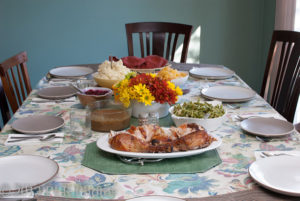 This Thanksgiving week, I’ve been thinking about how the ordinary lives of my ancestors are endlessly fascinating to me. As I slowly plow through my great great grandfather’s Civil War pension file, I get very excited when I come to a form he filled out 125 years ago that has a little extra information in it (like the names and birth dates of his children). Any peek into what his life was like is a special treat.
This Thanksgiving week, I’ve been thinking about how the ordinary lives of my ancestors are endlessly fascinating to me. As I slowly plow through my great great grandfather’s Civil War pension file, I get very excited when I come to a form he filled out 125 years ago that has a little extra information in it (like the names and birth dates of his children). Any peek into what his life was like is a special treat.
It got me thinking about how mundane aspects of our lives today might be really interesting 100 years from now to the people below us on the family tree.
Of course, we fill out fewer paper forms now. And genealogy will probably look very different in the twenty-second century. But I think photos and records will always be valuable.
This year, as we celebrate Thanksgiving (or really just go about our lives), we have the opportunity to create history for our descendants. We can be mindful of our legacy as we’re taking pictures. We can take care to label them (or add metadata to digital photos) so future generations know who the people in the photos are. We can do oral history interviews and carefully preserve them with labels for future generations.
If you have older relatives around your Thanksgiving table, I urge you to ask questions and preserve those conversations for generations to come (as well as for your own genealogy research). I sure wish I had. Wouldn’t it be great to put your hands on a recorded interview with one of your ancestors? You could be the person making that possible for your descendants.
Thanks to smartphone technology, it’s so easy for us to record conversations and take videos. Let’s do that while we can and mindfully tag and back up those recordings. (And hope that the medium will still be readable decades from now.)
As much as I urge my organizing clients to part with paper or other items that don’t serve any purpose any longer, I do sometimes encourage them to hang on to documents or photographs that might be of interest to their descendants. I encourage you to be mindful of that and store those items that so that they might be passed on to family-history-minded descendants when you pass.
Remember: Every day we have the opportunity to create history.
Photo by Robert and Pat Rogers via Flickr. Used under Creative Commons License.

Thank you for this! I look at all the binders filled with my handwritten notes from years ago. (I started doing genealogy before computers were even a dream.) I want to unburden myself from them, and yet I think, will someone, my descendants appreciate those notes in 100 years? This is a struggle of the last 2 years. Thanks for giving me more food for thought here. Thankful for you wonderful blog!
I’m so glad you found this post useful, Maria!!
With the wisdom of hindsight, I wish that my mother had started me off as a family scribe to keep a notebook of who was present at each holiday meal, what we ate, and maybe what we talked about or games we played. Did they spend the night with us? She had a lot of older half-siblings who had grandchildren before I was born, and their connections to her mystified me… not to mention the in-laws they sometimes brought. Notes like that would have helped me understand the relationships better, and I could even have kept her comments about which recipes worked well or not — those would have been very helpful for years afterward.
I love the idea of having a family scribe, especially if the scribe starts out as a child. Alas, hindsight is 20/20, isn’t it?